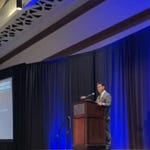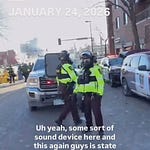By Nick Valencia | November 5, 2025
LOS ANGELES— The City of Angels has always been a mirror of America. It’s a place where the world collides and reinvents itself through labor, hustle, and food.
For decades, the city’s strength has come from immigration: from the Salvadoran bakeries in Pico-Union to the Oaxacan tamale stands in Koreatown, to the Mexican seafood trucks lining Olympic Boulevard. Every bite in this city tells the story of arrival and survival.
But that strength, journalist Memo Torres says, is exactly why it’s under attack.
I met Torres at L.A. Taco headquarters in Downtown LA, where their newsroom is a hybrid of street reporting, community advocacy, and unapologetic truth-telling . His journalism, which has earned comparisons to Edward R. Murrow, focuses on the people holding Los Angeles together: street vendors, day laborers, kitchen crews, and construction workers — the invisible majority.
“The world is here in L.A., and all through immigration,” he told me. “That’s why I love covering the food scene. Through food, you get to know all these different enclaves of immigrant communities. That’s L.A.’s biggest strength. And that’s why, to me, Trump targeted L.A.’s biggest strength. Because if you can do it here, [President Trump] can do it anywhere.”
A City on Edge
Torres’s work has become a form of social documentation — daily videos capturing raids, fear, and resilience. His “Daily Memo” dispatches once clocked in at under three minutes. Now they often run twice as long. “The amount of verification, the number of raids — it’s just getting more intense,” he said. “And people don’t really see it.”
His sources — lawyers, activists, vendors — describe a widening net. One attorney who volunteers in Adelanto, California’s sprawling immigration detention complex, told Torres that most detainees are now older adults, people in their 40s and 50s who can’t flee when agents arrive.
“And so you look at the videos and some of them are funny because you see these fat-ass agents falling over because they can’t catch the little kids that can jump a fence a get away,” Torres said, laughing bitterly. “But all the older folks — they’re going after them and tackling them to the ground like they’re fucking Lucha Libre stars or something. It’s like c’mon guys. What the hell?”
Behind the dark humor lies a chilling pattern. Federal raids have surged across Southern California in recent months, often without warrants or accountability. They’re framed as operations targeting “criminal aliens,” but on the ground, the reality looks far more indiscriminate — and deliberate.
“For us, it’s evident that they’re going after heads of households to try to dismantle the family,” I told him during our conversation. “What we’ve deduced from it all is that this is Family Separation 2.0.”
Torres nodded.
“They’re going after the Latino workforce. That’s what they’re going after. They want to hurt the economies of blue states, blue cities — and they’re doing it by going after the Latino population, which is the backbone of a lot of these places.”
Life in the Shadows
The fear stretches into the city’s kitchens, restaurants, and food trucks — the very spaces that define L.A.’s cultural identity. Torres recently visited several Mexican restaurants to feature on L.A. Taco’s list of the City’s 43 Best. The chefs and workers he met were proud but afraid.
At one restaurant, he said, sheriff’s deputies came in for lunch. “The owner took their order, turned around to the kitchen — and the staff was gone. They’d run out the back door because they thought it was Border Patrol.”
At another, employees had engineered an escape plan.
“They took me out back to show me this door that goes to an alley. They’d talked to the neighbors, shared a fence, so if there’s a raid, they can jump into the neighbor’s yard. Another spot has a van parked out back — literally like Anne Frank kind of stuff — where they can hide if they think there’s a raid.”
That is the state of Los Angeles right now. People working in peace, living in fear.
The Show Goes Where the Cameras Go
What’s most insidious, Torres says, is how federal enforcement has learned to control the narrative.
“Chief Bovino — the commander-at-large of Border Patrol — he loves to be on camera,” he told Nick Valencia News. “Where Bovino goes, the show goes. And he’s really good at keeping the cameras where he is.”
Which means that for much of America, the crisis remains invisible. The spectacle plays out where it’s safe for officials to stage it — not where the real damage is done.
The damage has been done to Los Angeles.
The work that Memo Torres and L.A. Taco are doing by documenting raids, profiling working-class Angelenos, showing how policy lands on the ground, isn’t just journalism— it’s witness.
Increasingly, it’s being recognized: there’s a growing push within the journalism community to see L.A. Taco’s coverage honored with a Pulitzer Prize. That campaign is about more than prestige. It’s about legitimizing a kind of reporting that legacy media long dismissed — the kind done in real time, from the frontlines of everyday life.











